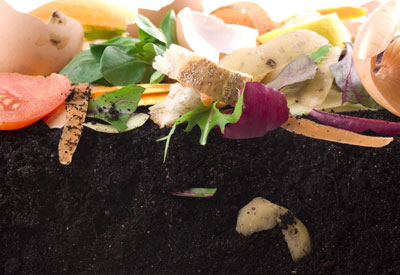Organics: Recovery and Recycling
 From feeding people to composting, there are many environmentally preferable options for diverting food and other organic waste from landfills and incinerators. Organic waste may include food waste, yard waste, paper products such as towels and napkins, and depending on jurisdiction, compostable ware. By reducing or diverting food and other organic wastes, you can reduce your environmental impact and avoid expensive disposal fees. Project Drawdown, an environmental non-profit out of San Francisco, ranks reducing food waste, specifically, as the #1 solution to limiting end-of-century warming to 2°C. It is crucial that organics are dealt with responsibly in any commercial setting.
From feeding people to composting, there are many environmentally preferable options for diverting food and other organic waste from landfills and incinerators. Organic waste may include food waste, yard waste, paper products such as towels and napkins, and depending on jurisdiction, compostable ware. By reducing or diverting food and other organic wastes, you can reduce your environmental impact and avoid expensive disposal fees. Project Drawdown, an environmental non-profit out of San Francisco, ranks reducing food waste, specifically, as the #1 solution to limiting end-of-century warming to 2°C. It is crucial that organics are dealt with responsibly in any commercial setting.
Source Reduction
Consider sources of organic waste and ways to reduce this waste at the source. For example:
- Reusable plates and utensils may eliminate the need for disposable options
- High-efficiency hand driers may replace paper towels
- Menu planning, portioning, inventory control, and consideration of preparation practices in the kitchen may reduce food waste
- Technologies like LeanPath and Winnow can help track materials in real-time as they are thrown away. These technologies help cut food waste and reduce purchasing costs
Feed People
Edible food waste can be donated to food banks and similar organizations. This may include:
- Unlabeled or mislabeled products
- Rejected products still safe for human consumption
- Discontinued items
- Off spec items
- Damaged items
- Close-dated items
- Past “best if used by” dated products
Donations of food are tax deductible, and The Bill Emerson Good Samaritan Food Donation Act protects good faith food donors from civil and criminal liability. Search for a food bank near you on the Feeding America website.
Feed Animals
Food waste can also be used to feed animals. In Minnesota, food-to-hog programs are popular. Hog farms can obtain permits to use pre-consumer and post-consumer food waste as feed. These farms may offer services like pick-up at your facility and collection containers. These services are usually fee-based, though the fees are typically less than trash hauling fees. Learn more at the MnTAP webpage Feeding Food Processing By-products to Livestock.
Industrial Uses
Various technologies exist that convert organics into high-value products such as soil amendments, pelletized fuel, and biogas. Anaerobic digestion is a commonly referenced technology that converts feedstocks such as food waste and manure into biogas and a solid product called digestate. The solid output can be used as fertilizer on farm fields, and the biogas can be converted to electricity or renewable natural gas.
Other technologies include dehydrators, hydrothermal carbonization, and pyrolysis and gasification.
Composting
Food and other organic waste can be recycled into compost. Food can be mixed with other organic materials, such as compostable plastics and paper products, and sent to a composting facility. This is often called organics recycling. More waste haulers are offering organics pick-up as a service. Besides the environmental benefit, recycling in the State of Minnesota is exempt from the solid waste tax of 17% for commercial entities. However, to make organics recycling feasible, your business must be located near a composting facility that can process the material (or be willing to compost on-site). The Minnesota Pollution Control Agency maintains a list of facilities on their . Learn more about compost .
Producing food is a resource-intensive endeavor. When we waste food, we waste all the inputs that go into producing the food at every stage of the process, from the water that goes into growing crops to the energy used to process and transport foods across the globe. Thirteen percent of greenhouse gases in the United States are associated with growing, manufacturing, transporting, and disposing of food*. In addition, landfills account for 14.5 percent of U.S. methane emissions, and food in landfills is a significant source of methane.
Call MnTAP today to investigate ways to reduce, reuse, and recycle your food and other organic wastes.